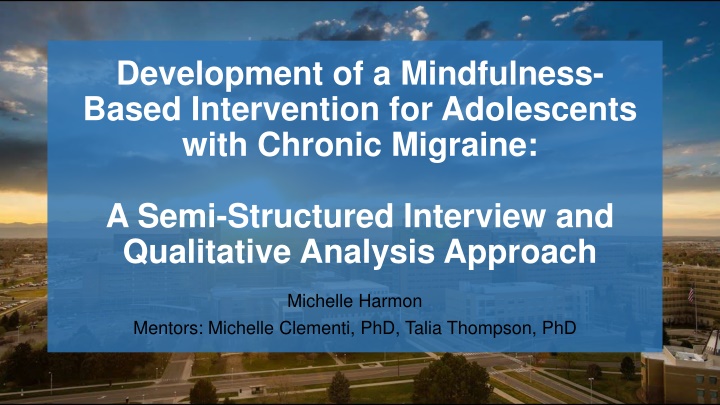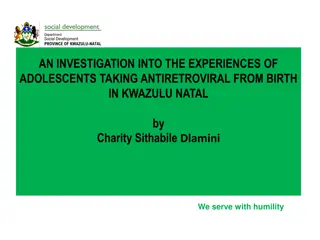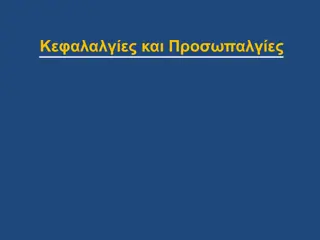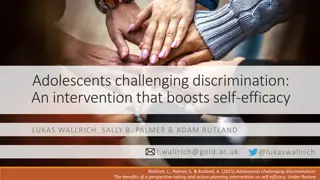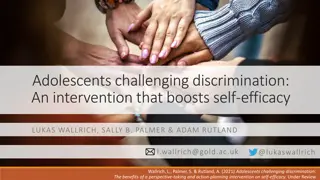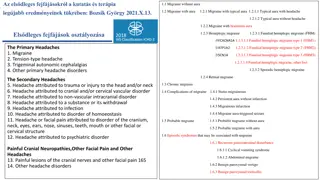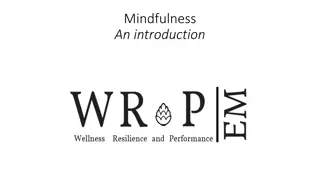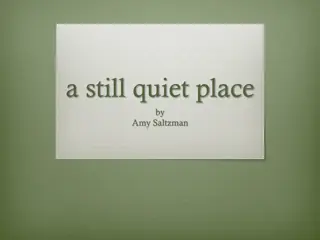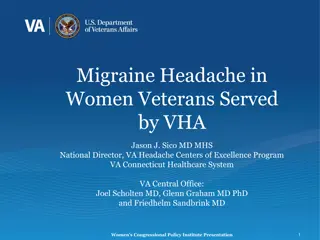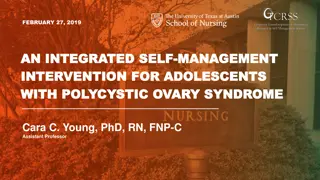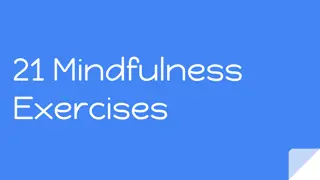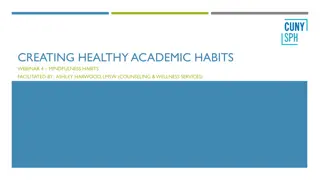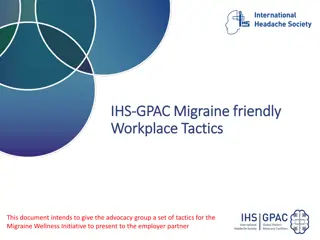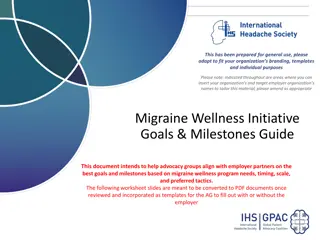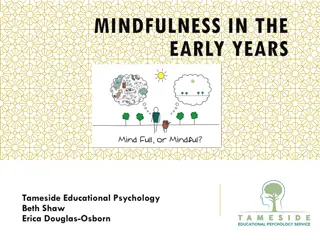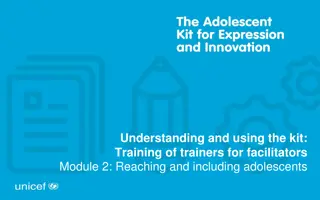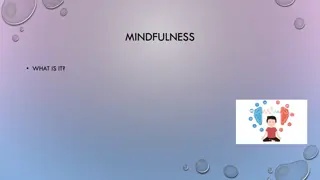Mindfulness-Based Intervention for Adolescents with Chronic Migraine: Qualitative Study
This study focuses on developing a mindfulness-based intervention for adolescents with chronic migraine, aiming to address the lack of effective treatments. Through remote interviews and qualitative analysis, stakeholders' experiences and feedback are being gathered to adapt the intervention. The research explores the impact of chronic migraine on adolescents and the potential benefits of mindfulness practices in managing this condition.
Download Presentation

Please find below an Image/Link to download the presentation.
The content on the website is provided AS IS for your information and personal use only. It may not be sold, licensed, or shared on other websites without obtaining consent from the author.If you encounter any issues during the download, it is possible that the publisher has removed the file from their server.
You are allowed to download the files provided on this website for personal or commercial use, subject to the condition that they are used lawfully. All files are the property of their respective owners.
The content on the website is provided AS IS for your information and personal use only. It may not be sold, licensed, or shared on other websites without obtaining consent from the author.
E N D
Presentation Transcript
Development of a Mindfulness- Based Intervention for Adolescents with Chronic Migraine: A Semi-Structured Interview and Qualitative Analysis Approach Michelle Harmon Mentors: Michelle Clementi, PhD, Talia Thompson, PhD
Background Migraine significantly increases in adolescence due to increased risk factors and disproportionately impacts youth from disadvantaged backgrounds Current available treatments for migraine are expensive, not as effective as placebo, produce unwanted side effects, or are not approve for patient use Mindfulness-based interventions (MBIs) have been shown to be effective in adults with chronic migraine, but little research has been done with adolescents
Study Aims Phase II Phase I Adapt an MBI based on stakeholder feedback to be pilot tested in a group of adolescents with chronic migraine Document the lived experiences of chronic migraine in adolescence from primary stakeholders (e.g., teens, parents, providers)
Study Sample Table 1. Demographics of Providers in Study Sample Adolescents with Chronic Migraine (13 18 years old) Mean age = 15.6 Prefer not to say (n=1); Females (n=3); Non-Binary (n=1) White (n=5); Black/African American (n=1); Hispanic (n=1) Parents of Adolescents with Chronic Migraine Mean age = 49.2 Females (n=5) White (n=4); American Indian/Alaska Native (n=1); Hispanic (n=1) Healthcare Providers Working with Adolescents with Migraine See Table 1.
Conducted Remote Interviews over Zoom Completed CCTSI ATLAS.ti Online Trainings Recruited 5 families and 5 providers Edited Transcripts for Coding Participated in Consensus Coding Meetings with Study Team Completed Rapid Qualitative Analysis of Provider Interviews Coded Interview Transcripts in ATLAS.ti Edited/Finalized Coding As Needed Adapting the Intervention Based on Qualitative Feedback Qualitative Analysis of All Interviews (in progress)
Interviews 15 one-on-one interviews with stakeholders (teens, parents, providers) were completed on Zoom Questions pertained to experiences with chronic migraine and mindfulness and feedback about intervention delivery: What is it like having headaches or migraine? There are lots of different practices that are related to training people to be more mindful. Some are meditation, yoga, body scan, visualization, which means picturing something in your mind, and others. Have you ever done any of these practices?
Transcribing Interview transcripts were edited/transcribed verbatim using saved audio file and generated txt file to correct transcription Final transcripts were converted to Word files to be imported into ATLAS.ti software for coding
ATLAS.ti Coding Table 2. Examples of Qualitative Deductive Codes A preliminary deductive codebook was designed by the study team based on MBI and intervention adaptation theories Open (inductive, representing emergent themes) codes were added during the coding process Discrepancies in coding were discussed during team meetings and codebook was refined as needed to reflect team consensus Code Definition Example Migraine Management (Broad) How teens manage or treat their migraine Medications, doctors appointments, healthy lifestyle habits Migraine & Emotions How migraine relates to emotions Feelings of stress due to migraine, missing out on social events, feelings of hopelessness related to migraine
Rapid Qualitative Analysis Five provider interview transcripts were rapidly analyzed by the study team for preliminary reporting of result Interview summaries were consolidated into a structured matrix to identify common themes and stakeholder priorities
Qualitative Analysis Qualitative analysis of all interviews currently in progress Codes and categories from analysis will be synthesized into themes/subthemes
Preliminary Theme 1. Developmental Considerations for Teens Teens Prioritize Peer-to-Peer Support "I think just that camaraderie and not just sympathy but empathy that people can share with each other can really be helpful in that sense of community. So, I really love the group aspect of this Short-Term Vs. Long-Term Thinking in Adolescence The intervention I'm asking you to do is not gonna happen overnight .I think that's been the biggest thing is just going like, hey I know this is gonna take time." Teen Autonomy I think having a good balance of like autonomy with the teen and trusting them that they're gonna do [the mindfulness practice]. Then, also having parents stepping in when they need to."
Preliminary Theme 2. Facilitators for Program Buy-In and Participation Patients Desire Non-Pharmacological Options "I think I have a lot of teens and their parents who are like, don't want to try medicine, or they're like fed up with medicine, or they want like an adjunct to it. Neurology Providers are a Resource for Encouraging MBI as a Treatment Option I will mention the benefits that we have seen from fMRI studies of the brain. So, I'll say, you know, studies have already shown that we have more activity in our frontal lobe, which, when we're using consistent meditation or mindfulness practices daily, so you can think better, you can focus better. MBI Must Consider Migraine-Specific Health Needs We're talking about teens who have chronic migraine and might be like, oh, I'm not going to turn my camera on today because it's too bright, or I don't feel well I can't participate.
Conclusions & Future Implications In addition to rapid analysis, data from all stakeholder interviews is currently being analyzed by the study team to extract themes and subthemes We anticipate seeing themes/subthemes discussing parent migraine experiences, acceptability of the remote group program, teen personalities, etc. Themes and subthemes deduced from qualitative analyses will be used to tailor MBI ("Learning to BREATHE"; Broderick, 2021) to the unique needs of adolescents with chronic migraine and will be pilot tested as a telehealth group format
Acknowledgements This study was funded by The Children s Hospital Research Institute We would like to thank our study collaborators, consultants, and PURPLE and Department of Psychiatry faculty members
Questions? Presenter: Michelle Harmon Michelle.Harmon@ChildrensColorado.org Mentor: Michelle Clementi, PhD Michelle.Clementi@ChildrensColorado.org Qualitative Consultant: Talia Thompson, PhD Talia.Thompson@ChildrensColorado.org
